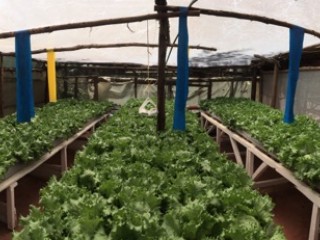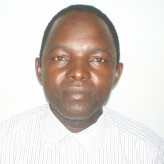Project Results:
Hydroponics for urban slums
Soil-less farming in small urban spaces
About
The director of Hydroponics Kenya came with a pro-poor proposal for water efficient horticulture for slum areas. In hydroponics the plants grow from nutrients added to water instead of from soil. In the first project phase several models were designed that were piloted in the second phase among 2 schools and 22 families. The application was one of the 8 first round challenge winners, whereafter Hydroponics Kenya received further accompany of Business for All/Africa Funded.
Key results
-
Designs were made as planned and the pilots were implemented, a.o. in a project in Rwanda
- 24 clients have been successfully testing; 1 not successful (the orphanage).
- Total 142 units installed, having produced 118,000 kg per year of harvest.
- Provision of agricultural education and advisory services, to get the best water management, pest control and harvest.
-
Sales of a nutrient solution as part of the revenue stream.
-
Less water use than with normal horticulture (up to 70% saving).
-
Improved economic situation households and schools (no need to buy vegetables anymore).
-
Improved health status.
-
Improved awareness among pupils about growing and value of nutritious food.
Tips for the future
-
The school projects need quite some attention.
-
A business should depend on more capable persons instead of one individual.
-
To build a company on trust is fine, but proper administration, e.g. of credit repayments, is also necessary.
Potential for growth
This project is one of our best scaling projects. It is the combination of pro-poor, water efficiency and agriculture, which makes it attractive to other funders. Through our business support the director of Hydroponics Kenya made several proposals to a.o. Securing Water for Food and KCIC. Both provided follow-up funding. In total, scaling is more than a factor 8.
Nevertheless, the organization is not yet scaling as one would expect. Several elements are withholding the innovation, one of them being the marketing focus on NGOs as intermediates.
Project partners
Hydroponics Kenya
Period
2016 – Mid 2018
Location
Nairobi, KenyaLast project updates
Background
Hydroponics Kenya is a privately owned limited company pioneering hydroponic farming technology in East and Central Africa. We specialize in the manufacturing, installation and marketing of customized hydroponic fodder and vegetable systems to help small and medium holder farmers have access to a high quality, cost-effective and sustainable way of farming. Hydroponic farming entails growing crops using mineral nutrient solutions in water thus reducing the need for soil. Our modern and innovative farming technology is resilient to climate change, provides superior nutritional value and faster growth at limited cost of input.
Since 2012, we have successfully sold over 500 greenhouse units, 700 hydroponic fodder systems and trained more than 5,200 people in Kenya, Uganda, Rwanda and Tanzania.
We also offer training and demonstration of the hydroponic system at our office in Zambezi, Kikuyu, Kiambu County, Nairobi.
Project Plan
The project will start with an inception and design phase, after which several pilots will be made of three different installations; some of them to be showed in a demonstration plot. Meanwhile, a marketing study will be made to get ready for the upscaling/take off at the end of the project.
Target group
Small and medium urban farmers
Sustainability
Financial sustainability: For Hydroponics as a company, the products are designed to get a good market; whereas the sale of dissolved nutrients (formulae) will provide a constant revenue stream. For the buyers of the systems, the break even point is reached within 2 years, compared to traditional systems.
Institutional sustainability:
Design and production will be in line with legal context.
Environmental sustainability:
The product will reduce the need for water (80% more efficient) and soil (can be done without earth); have close cycle and can be done according to organic standards. Drain water is recycled in the system. The systems will replace the use of untreated waste water, a poor practice in most of the low income areas. Pipes are from recycled plastics.
Technical sustainability:
All installations will be locally made with mostly local products.
Social sustainability:
The installations will be tested for their responsiveness to needs of the local producers, with a specific focus on women in low income areas.
Overview of Goals
Our main goal is achieving sustainable small and medium urban farming areas through access of quality , cost effective methods also we are targeting to achieve Enhanced household food security, Increased nutrition in diet, Fresher and healthier products, Enhanced local employment opportunities and more control over the food delivery chain.
Results and indicators
- Marketing plan feasible
- marketing plan 1 plan ( target )
- hydroponic product lines for urban low income areas
- product lines developed and positively tested and affordable 3 ( target )


